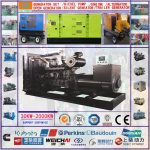Introduction
In the modern world, the uninterrupted supply of power is crucial for the smooth functioning of various industries, businesses, and essential services. However, power outages and fluctuations are common occurrences that can disrupt operations and lead to significant economic losses. To mitigate the impact of such disruptions, many organizations rely on backup power sources such as diesel generators to provide a reliable source of electricity during emergencies.
Diesel generators are particularly well-suited for handling transient loads, which are sudden and temporary increases in power demand that can strain the grid or overwhelm conventional power sources. In this article, we will explore the importance of diesel generators for transient loads, their key features and benefits, as well as best practices for their installation and maintenance.
Importance of Diesel Generators for Transient Loads

Transient loads, also known as peak loads or surges, occur when there is a sudden spike in power demand that exceeds the capacity of the existing power supply infrastructure. These spikes can be caused by various factors such as starting up heavy machinery, sudden changes in weather conditions, or unexpected equipment failures. Without a reliable backup power source to handle these transient loads, businesses risk facing downtime, equipment damage, and financial losses.
Diesel generators play a crucial role in providing a quick and effective solution to manage transient loads. Unlike renewable energy sources like solar or wind power, diesel generators can be started up rapidly and provide a reliable source of power regardless of external conditions. This makes them ideal for handling sudden spikes in power demand and ensuring uninterrupted operations during critical moments.
Key Features and Benefits of Diesel Generators for Transient Loads
1. Rapid Response Time: One of the primary advantages of diesel generators is their ability to start up quickly and provide power within seconds of a power outage. This rapid response time is essential for handling transient loads that require immediate attention to prevent disruptions or damage to equipment.
2. High Power Output: Diesel generators are known for their high power output capabilities, making them well-suited for handling peak loads that exceed the capacity of the grid or other power sources. This ensures that critical equipment and processes can continue to operate smoothly even during periods of high demand.
3. Fuel Efficiency: Diesel generators are more fuel-efficient compared to other types of generators, allowing them to provide continuous power for extended periods without requiring frequent refueling. This makes them a cost-effective solution for managing transient loads and ensuring uninterrupted power supply.
4. Longevity and Durability: Diesel generators are built to withstand harsh operating conditions and heavy usage, making them a reliable backup power source for businesses and industries. Their robust construction and high-quality components ensure long-term performance and minimal maintenance requirements.
5. Scalability: Diesel generators are available in various sizes and configurations to meet the specific power requirements of different applications. 150kw diesel generator for remote power supply makes them suitable for a wide range of transient load scenarios, from small-scale businesses to large industrial facilities.
Best Practices for Diesel Generator Installation and Maintenance
To maximize the effectiveness of diesel generators for handling transient loads, it is essential to follow best practices for their installation and maintenance. Here are some key guidelines to ensure the reliable operation of diesel generators:
1. Proper Sizing: It is crucial to correctly size the diesel generator based on the peak power demand of the transient loads it will be expected to handle. Undersized generators may struggle to meet the required power output, while oversized generators can lead to inefficiencies and increased operating costs.
2. Regular Testing: Diesel generators should be tested regularly to ensure they are in proper working condition and capable of handling transient loads when required. Scheduled load bank testing can help identify any issues or inefficiencies in the generator system and allow for timely maintenance.
3. Fuel Quality: The quality of fuel used in diesel generators is critical to their performance and longevity. It is essential to use clean, high-quality diesel fuel and to monitor fuel levels regularly to prevent contamination or degradation that can affect the generator's operation.
4. Maintenance Schedule: Establishing a regular maintenance schedule for diesel generators is essential to prevent unexpected failures and ensure continuous operation during transient load scenarios. Routine inspections, oil changes, filter replacements, and other preventive maintenance tasks should be performed as per the manufacturer's recommendations.
5. Emergency Preparedness: In the event of a power outage or transient load situation, it is important to have a well-defined emergency response plan in place. This plan should outline the steps to take to start up the diesel generator, transfer the load, and ensure the seamless transition to backup power.
Conclusion
Diesel generators play a critical role in ensuring the reliable supply of power for handling transient loads in various industries and applications. Their rapid response time, high power output, fuel efficiency, and durability make them an ideal solution for managing sudden spikes in power demand and preventing disruptions during critical moments. By following best practices for installation and maintenance, businesses can leverage the benefits of diesel generators to enhance power supply reliability and minimize the impact of power outages on their operations.
